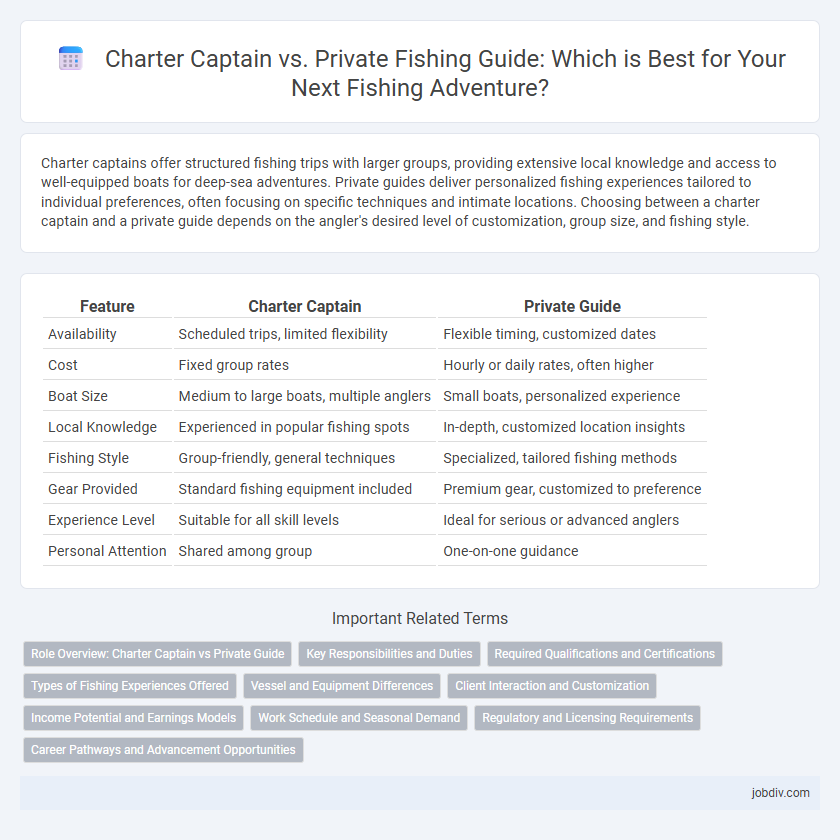Charter captains offer structured fishing trips with larger groups, providing extensive local knowledge and access to well-equipped boats for deep-sea adventures. Private guides deliver personalized fishing experiences tailored to individual preferences, often focusing on specific techniques and intimate locations. Choosing between a charter captain and a private guide depends on the angler's desired level of customization, group size, and fishing style.
Table of Comparison
| Feature | Charter Captain | Private Guide |
|---|---|---|
| Availability | Scheduled trips, limited flexibility | Flexible timing, customized dates |
| Cost | Fixed group rates | Hourly or daily rates, often higher |
| Boat Size | Medium to large boats, multiple anglers | Small boats, personalized experience |
| Local Knowledge | Experienced in popular fishing spots | In-depth, customized location insights |
| Fishing Style | Group-friendly, general techniques | Specialized, tailored fishing methods |
| Gear Provided | Standard fishing equipment included | Premium gear, customized to preference |
| Experience Level | Suitable for all skill levels | Ideal for serious or advanced anglers |
| Personal Attention | Shared among group | One-on-one guidance |
Role Overview: Charter Captain vs Private Guide
A Charter Captain operates licensed vessels, providing fishing trips for groups or individuals with safety regulations and commercial certifications, while a Private Guide offers personalized, one-on-one fishing experiences using their own boat or local knowledge. Charter Captains often manage larger boats with full crews and amenities, catering to tourists seeking structured outings, whereas Private Guides specialize in tailored techniques, species expertise, and local hotspots for anglers desiring intimate, customized adventures. Both roles require extensive fishing skills and knowledge, but Charter Captains emphasize vessel operation and guest management, contrasting with Private Guides' focus on personalized angling instruction and location-specific tactics.
Key Responsibilities and Duties
Charter captains manage entire fishing trips, ensuring vessel safety, navigation, and compliance with maritime regulations, while providing expert advice on fishing techniques and local hotspots. Private guides focus on personalized client experiences, tailoring fishing strategies to individual skill levels and preferences, often enhancing shore access and equipment handling. Both roles require extensive knowledge of fish behavior, weather patterns, and local ecosystems to maximize catch success and client satisfaction.
Required Qualifications and Certifications
Charter captains must hold a valid Coast Guard Captain's License (e.g., 100-ton), ensuring compliance with federal maritime safety and operational standards. Private fishing guides typically require a state-issued guide license or permit, which varies by location and often includes certifications in first aid and local wildlife regulations. Both roles prioritize safety training and knowledge of fishing laws, but charter captains face more stringent federal certification requirements due to commercial vessel operations.
Types of Fishing Experiences Offered
Charter captains provide structured, full-service fishing trips on larger boats equipped with advanced gear, targeting specific fish species in diverse waters ideal for groups or families. Private guides offer tailored, personalized fishing experiences often on smaller vessels or shorelines, emphasizing local knowledge and customized techniques suited for individual anglers or couples. Both services accommodate various fishing styles, but charter captains excel in offshore deep-sea fishing while private guides specialize in inshore, fly fishing, and freshwater adventures.
Vessel and Equipment Differences
Charter captains typically operate larger, professionally maintained vessels equipped with advanced navigation systems, fish finders, and a wide range of fishing gear tailored for various species. Private guides often use smaller, more personalized boats, allowing for customized fishing experiences with specialized equipment suited to specific angling techniques. The differences in vessel size and equipment directly impact the fishing conditions, target species, and overall trip flexibility.
Client Interaction and Customization
Charter captains typically manage larger boats and accommodate groups, offering standardized trips with less personalized interaction. Private guides provide one-on-one attention, allowing tailor-made fishing experiences based on the client's skill level, preferences, and target species. The personalized approach of private guides enhances customization, resulting in more adaptive and client-focused fishing excursions.
Income Potential and Earnings Models
Charter captains typically earn income through structured daily or half-day rates, often supplemented by tips, making their earnings more predictable but limited by the number of trips booked. Private guides usually charge hourly or per-trip fees, allowing greater flexibility to maximize earnings during peak seasons or special requests, often resulting in higher income potential per outing. Both roles rely heavily on reputation and client base size, but private guides can enhance revenue through personalized services and higher premium rates.
Work Schedule and Seasonal Demand
Charter captains typically operate on a fixed schedule aligned with peak fishing seasons, accommodating groups and maintaining strict booking calendars. Private guides offer more flexible hours, tailoring outings to individual clients' availability and niche seasonal hotspots. Seasonal demand influences both roles, with captains often booked months in advance during prime times, while private guides adjust operations dynamically to local fish migrations and weather patterns.
Regulatory and Licensing Requirements
Charter captains operate under stricter regulatory frameworks, often requiring commercial fishing licenses and compliance with coast guard safety standards, ensuring they meet federal and state laws for passenger transport. Private guides typically need state-specific fishing guide licenses and must adhere to local fishing regulations, but their requirements are generally less comprehensive than those for charter operations. Understanding the licensing distinctions helps anglers choose services that align with legal standards and safety assurances.
Career Pathways and Advancement Opportunities
Charter Captains typically progress through licensing and gaining extensive offshore experience, leading to opportunities managing larger vessels and fleets, increasing earning potential. Private Guides often advance by building strong client relationships and specializing in niche fishing techniques, which can lead to exclusive contracts and higher rates. Both career paths demand continuous skill enhancement, but Charter Captains generally have clearer regulatory benchmarks facilitating career advancement.
Charter Captain vs Private Guide Infographic

 jobdiv.com
jobdiv.com